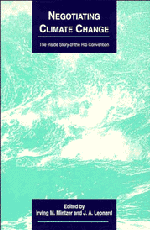Book contents
- Frontmatter
- Contents
- Acknowledgements
- Commonly Used Acronyms
- Foreword
- Part I Background
- Part II Views from Within the Ring
- Part III The Outside Edges In
- 11 Some Comments on the INC Process
- 12 A View from the Ground Up
- Part IV Prospects for the Future
- Appendix: The Framework Convention on Climate Change
- Index
11 - Some Comments on the INC Process
Published online by Cambridge University Press: 01 June 2011
- Frontmatter
- Contents
- Acknowledgements
- Commonly Used Acronyms
- Foreword
- Part I Background
- Part II Views from Within the Ring
- Part III The Outside Edges In
- 11 Some Comments on the INC Process
- 12 A View from the Ground Up
- Part IV Prospects for the Future
- Appendix: The Framework Convention on Climate Change
- Index
Summary
Prologue
The negotiations of the Framework Convention on Climate Change dealt with very complex issues. The potentially profound worldwide impacts of any measure to reduce greenhouse gas emissions made these negotiations qualitatively more difficult than the negotiations that led to the 1987 Montreal Protocol on Substances that Deplete the Ozone Layer.
Business participation in the climate negotiations, and in international negotiations within the UN system in general, is a very new phenomenon. Traditionally, business has not taken part in such negotiations, nor has it particularly pressed to be included. To an “outsider” from the business community, the whole UN system has appeared to be a rather ponderous political machine that inches slowly along and accomplishes relatively little. Consequently, many business leaders have concluded in the past that an attitude of “benign neglect” for the whole process is most appropriate.
This attitude appears to be changing, albeit slowly. The UN Conference on Environment and Development (UNCED, also called The Earth Summit or Rio '92) and the preparatory process leading up to it provided new opportunities for business leaders to participate in a critically important international debate. Maurice Strong, Under-Secretary General of the UN and chairman of the Earth Summit, and others worked hard to open up the process, engaging as many non-governmental organizations (NGOs) and others as possible. Strong made a special effort to include representatives of business and industry.
- Type
- Chapter
- Information
- Negotiating Climate ChangeThe Inside Story of the Rio Convention, pp. 229 - 238Publisher: Cambridge University PressPrint publication year: 1994
- 2
- Cited by



